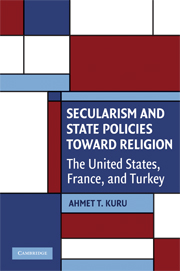Book contents
- Frontmatter
- Contents
- List of Figures and Tables
- Glossary of Abbreviations
- Acknowledgments
- Secularism and State Policies toward Religion
- Introduction
- 1 Analyzing Secularism
- PART I THE UNITED STATES
- PART II FRANCE
- PART III TURKEY
- 6 Assertive Secularism and the Islamic Challenge (1997–2008)
- 7 Westernization and the Emergence of Assertive Secularism (1826–1997)
- Conclusion
- Appendix A State-Religion Regimes Index of 197 Countries
- Appendix B Human Development and Official Religion in 176 Countries
- Appendix C State-Religion Regimes in Forty-Six Muslim Countries
- Appendix D Turkey's National Security Council Decisions, February 28, 1997
- Bibliography
- Index
7 - Westernization and the Emergence of Assertive Secularism (1826–1997)
Published online by Cambridge University Press: 05 June 2012
- Frontmatter
- Contents
- List of Figures and Tables
- Glossary of Abbreviations
- Acknowledgments
- Secularism and State Policies toward Religion
- Introduction
- 1 Analyzing Secularism
- PART I THE UNITED STATES
- PART II FRANCE
- PART III TURKEY
- 6 Assertive Secularism and the Islamic Challenge (1997–2008)
- 7 Westernization and the Emergence of Assertive Secularism (1826–1997)
- Conclusion
- Appendix A State-Religion Regimes Index of 197 Countries
- Appendix B Human Development and Official Religion in 176 Countries
- Appendix C State-Religion Regimes in Forty-Six Muslim Countries
- Appendix D Turkey's National Security Council Decisions, February 28, 1997
- Bibliography
- Index
Summary
Assertive secularism became the dominant ideology in the founding of the Turkish Republic due to the impact of the Ottoman ancien régime. In the Ottoman Empire, Islamic law was dominant in legal and judicial systems. The Şeyhülislam – the head of the ulema (doctors of Islamic sciences) – held important political authority within the monarchical system. The ulema played significant roles in the center (Istanbul) and other parts of the empire. They were responsible for religious services, education, legal interpretation, judiciary, management of the foundations, and taxation.
The Ottoman Empire was not a theocracy for two main reasons. First, Islamic law was not the only source of legislation. The sultans were making certain laws based on political needs. The Turkish name of Suleiman the Magnificent (1494–1566), for example, was Kanuni (the lawmaker). Second, the Ottoman ulema were civil servants paid by the state and under the political control of the sultan. Moreover, like the ulema in other Sunni countries, they were different from the Catholic clergy and Shia ulema in the sense that their differences from laypeople were functional instead of theological. The legitimacy of the Ottoman ulema largely came from the state's endorsement, their knowledge, and the people's acceptance, instead of from a specific religious hierarchy.
The Ottoman sultans ruled the core of the Muslim territories and claimed to be the caliphs of the Muslims for centuries. In the Ottoman millet system, the Turks were considered part of the Muslim millet (religious community) rather than a separate entity.
- Type
- Chapter
- Information
- Secularism and State Policies toward ReligionThe United States, France, and Turkey, pp. 202 - 235Publisher: Cambridge University PressPrint publication year: 2009



